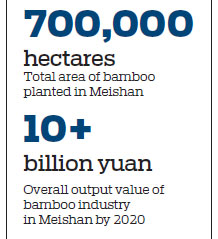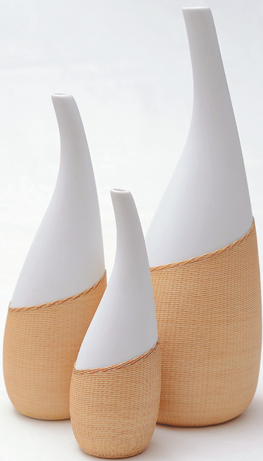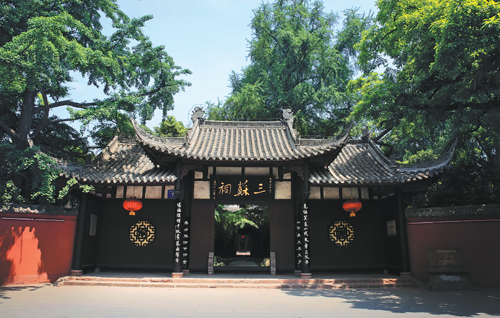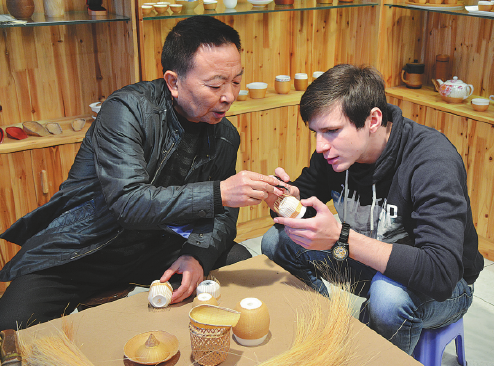Meishan nurtures bamboo industry for sprouts of success
Meishan, a city adjacent to Sichuan province's capital Chengdu, is to demonstrate its unique bamboo culture and industry to the world in the 2019 Beijing International Horticultural Exhibition, which will run from April 29 to Oct 7.
The city joined hands with the International Bamboo and Rattan Organisation, or INBAR, to develop a garden for the event to demonstrate the charm of bamboo and rattan.
The 3,000-square-meter garden, one of the largest bamboo structures in North China, is a joint work of Italian designer Mauricio Cardenas Laverde and some Chinese design companies. More than 70 percent of bamboo in the garden is from Meishan, according to Meishan's government.
There will be a Meishan Dongpo pavilion in the garden to tell stories about Su Dongpo and bamboo. Dongpo is the courtesy name of famous poet Su Shi in the Song Dynasty (960-1279), whose hometown was Meishan. The popular Chinese dish Dongpo braised pork is believed to be created by Su Dongpo.
|
Bamboo weaving has become a branded product of Meishan. |
Through bamboo art performance, video, do-it-yourself programs and online workshops, visitors will also learn about the development of Meishan's bamboo industry and the city's contribution to the rattan sector, according to Meishan's government.
The garden is called the Eye of Bamboo due to its unique shape.
Zhu Yujian, director of the Chinese events management department at the INBAR, said the organization sought cooperation with Meishan to use its local elements, especially culture to combine bamboo with handcrafted weaving.
Zhu said the eye-catching garden includes a special "air tree" which uses solar power and creates a cool air flow in hot conditions.
A series of accompanying activities will be arranged during the 162-day event, including a competition for bamboo structure design, bamboo and rattan culture week and other promotional events.
Meishan bamboo
Making bamboo products is one of the pillar industries of Meishan. The city has 700,000 hectares of bamboo and boasts more than 300 varieties. Bamboo weaving, bamboo-based paper and bamboo-made construction materials have become branded products of Meishan. Meishan's bamboo weaving items are sold to more than 50 countries and regions including the United States and Japan, according to the local government.
The overall output value of the bamboo industry of Meishan was 6 billion yuan ($894.96 million) in 2018.
In Meishan, bamboo not only creates economic value for locals, but also helps the city strengthen ties with the outside world. Bamboo weaving produced in Qingshen county of Meishan was added to the list of national intangible cultural heritage in 2008.
The China bamboo art city in Qingshen county is a training center for the INBAR. More than 5,000 people from more than 30 countries and regions including the Philippines, Ethiopia, Vietnam and Indonesia have been trained in the art city over the past 18 years, according to the local government.
Bamboo weaving products from Qingshen have been given to many foreign state leaders as gifts.

The 2018 International Bamboo Industry Fair was held in Meishan to strengthen communications in the industry.
Hans Friederich, director-general of the INBAR, said that the organization chose Meishan to host the fair because the city has rich bamboo resources, and the local government pays close attention to the bamboo industry and strives to use bamboo to promote environmentally friendly upgrading and transformation.
Looking ahead, Meishan will continue to develop the bamboo industry.
Luo Jiaming, mayor of the city, said Meishan will strive to boost the overall output value of the bamboo industry to more than 10 billion yuan by 2020. There will be more bamboo-themed counties, towns and villages by then.
This year, apart from supporting the 2019 Beijing International Horticultural Exhibition, the city hosted the Meishan Dongpo International Half-Marathon in March and plans to host an international meeting focusing on historic villages protection. All three events will help to boost the city's image globally, according to the local government.
Meishan will also strive to enhance its business environment, continue to attract leading businesses and expand its talent pool to support the economic growth of the region. Currently, the number of Fortune Global 500 companies in the region ranked only after Chengdu in Sichuan province, according to the local government.
The city will make efforts to become part of the China (Sichuan) Pilot Free Trade Zone and develop bonded areas and bonded logistics areas (Type B) to better serve business demand.
|
An exterior view of the ancestral temple of poet Su Shi and his family members in Meishan. Provided to China Daily |
|
A foreign visitor learns about bamboo weaving skills in Meishan, Southwest China's Sichuan province. Yu Tao / China Daily |
(China Daily 04/27/2019 page30)

















